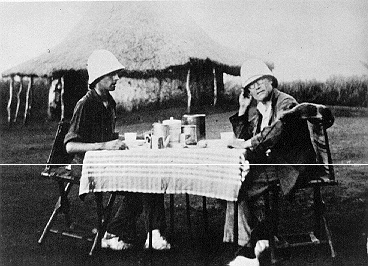Andre Gide’s account of his second journey into Africa provides a deeper look into the organization of the French colonies. Although he does not bluntly condemn the colonial officers that he meets during his voyage in the Congo in 1925, he does mention certain characteristics of the French colonial administration that he finds troubling. The book was pivotal since it stated the problems associated with the French presence in Africa. Most other books about Africa during this time period were written to further the aims of nationalists or to justify the agendas of companies and colonial officers. Gide’s chronicles of his voyage were not written with any such hidden agenda. A well-known author, Gide was able to challenge the assumptions of many French as to whether the French presence in Africa was so successful after all.
 André Gide
with Marc Allegret and Dindiki in the Congo
André Gide
with Marc Allegret and Dindiki in the Congo
Gide first shocks the reader when he discusses the abuses committed by the French officer, Pacha, against the natives. He is bolder in his criticism when he alludes to the idea that although Pacha was an extreme case in French Africa, every officer had his own shameful secrets. Gide often leaves many descriptions of his voyage hanging and the reader will not ever know the end of the story he started to tell. He does however include the most important pieces of information which contribute to a commentary on the abuses of the region. However, it seems that Gide is also careful not to blame the French leaders in Africa directly for their faults, but instead he points out the lack of resources, personnel, and organization in the colonies. The reader can easily gather that Gide does not think the French should leave Africa, but instead, should devote more money and people to the region, in order for it to be an admirable mission.
Gide’s Voyage au Congo sparked many criticisms of the French colonial system after its publication. It is interesting to review and compare the travel documents and chronicles of French travelers in Africa from the start of the expansion into Africa and then later in the colonization period, when Gide’s book was written. Did the spirit of colonization remain a nationalistic one after people realized all the abuses occurring in Africa? This leads to an interesting topic to research. Another area of interest is an inquiry as to whether or not the French government made any improvements in the organization and government of its African colonies after it realized the problems associated with its short-handed approach there. We have provided some places to start researching these topics in the related web page.